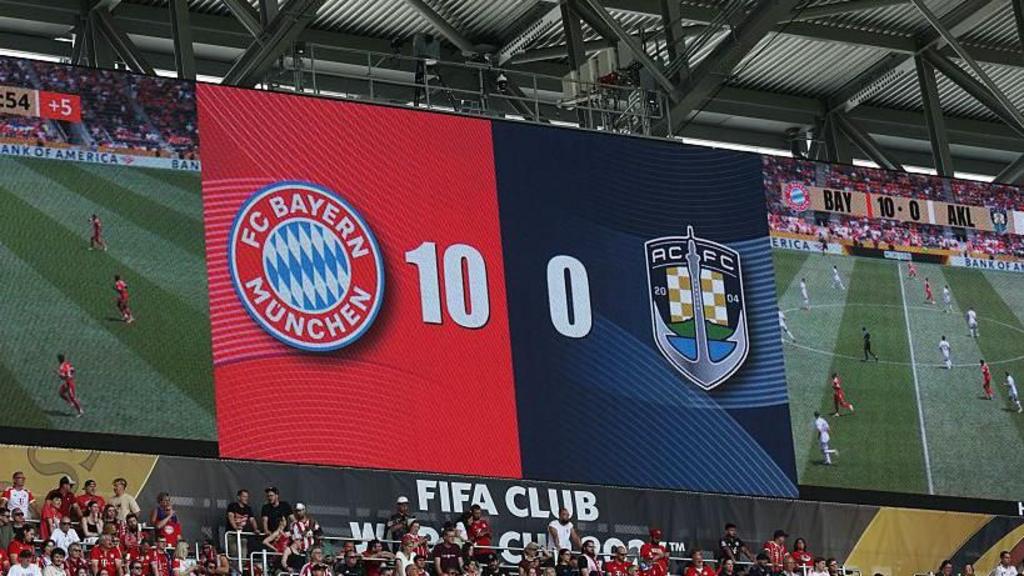Bayern Munich routed Auckland City 10-0 in their Club World Cup opener, a result highlighting the significant disparity in talent between the competing teams. Thomas Müller, departing Bayern this summer, contributed his 250th goal for the club during the match.
The match showcased a stark contrast in professional football capabilities.
For Auckland City, a part-time New Zealand team, upsetting the powerhouse that is Bayern Munich—34-time German champions and six-time UEFA Champions League winners—was always an improbable feat.
Kingsley Coman’s early goal effectively ended any hope of an upset. Bayern reached double figures for the first time since August 2021, setting a new Club World Cup record.
The final score, 10-0, could have been even more lopsided. Bayern has previously achieved 10-goal victories in the Bundesliga (11-1 vs. Dortmund in 1971) and DFB-Pokal (12-0 vs. Bremer SV in 2021).
The match briefly threatened Bayern’s club-record 16-1 win over DJK Waldberg in 1997-98. Goals from various players, including Müller and Coman, put Bayern ahead 6-0 by halftime, equalling Al-Hilal’s record in the Club World Cup.
Jamal Musiala, substituting for Harry Kane, scored a hat-trick in the second half, before Müller’s late goal sealed the victory and reached his personal milestone of 250 goals for Bayern.
Bayern Munich sets record with 10-goal victory
The Club World Cup: A serious competition?
Fifa, the Club World Cup, and Saudi Arabia’s influence
Bayern dominated possession (71%) and outshot Auckland 31-1 (17-1 on target). The disparity extended beyond the pitch.
Auckland’s reported revenue (£488,000) pales in comparison to Bayern’s (£810 million). Auckland’s players are subject to a salary cap of approximately £66 per week, while Kane earns approximately £400,000 weekly. The team’s market value reflects the chasm: Auckland at £3.9 million and Bayern at £769 million.
Prize money further illustrates the imbalance: Auckland received £2.6 million, while European clubs earn between £9.9 million and £29.6 million. Opta’s Power Rankings place Bayern sixth globally, while Auckland ranks 5,074th, significantly below even some English lower-league teams.
Auckland’s squad includes a diverse group of individuals with professions outside of professional football, including a teacher, an insurance broker, a barber, and students, underscoring the contrast with Bayern’s star-studded lineup.
Fifa’s expansion of the Club World Cup to 32 teams has already sparked legal challenges. The Bayern-Auckland match further fuels debate about the tournament’s new format.
Auckland’s participation stems from their consistent success in the OFC Champions League, appearing for a record 12th time. However, the question of their suitability to compete against teams like Bayern remains.
Previous Club World Cup appearances show a pattern of significant losses for Auckland. Despite their regional dominance, the gap in quality is undeniable.
Commentators and fans alike expressed concerns about the mismatch, questioning the fairness and entertainment value of such a contest. Olise’s candid response (“No”) to a question about sympathy for Auckland highlights this sentiment.
Auckland’s coach acknowledged the reality of facing a world-class team, while Bayern’s manager emphasized taking the game seriously, albeit acknowledging the growing challenge as the tournament progresses.
Bayern’s next match is against Boca Juniors, a clash anticipated as a more evenly matched contest.
Listen to the latest Football Daily podcast
Get football news sent straight to your phone
Comments can not be loaded
To load Comments you need to enable JavaScript in your browser

